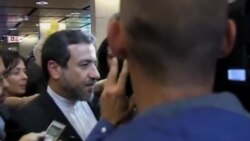GENEVA —
Iranian and international negotiators will continue nuclear talks on Wednesday after a long day of meetings Tuesday that stretched into the evening. Iran says international negotiators welcomed a proposal its foreign minister made, but the substance of the proposal remains secret.
Iran's Deputy Foreign Minister Abbas Araqchi said the Iranian presentation was received “in a positive atmosphere,” and was followed by a “serious” exchange of questions and answers. He was mobbed by reporters during a brief appearance at the press center.
"We are very serious. We are not here just symbolically, we are not here to waste our time. We are serious for real target-oriented negotiations between Iran and the other side, and we believe that the plan that we have introduced has the capacity to reach that,'' he said.
Officials say the Iranian plan was presented by its Foreign Minister Mohammed Javad Zarif in a nearly hour-long PowerPoint slide show.
His deputy, Araqchi, said the foreign minister told the group the dispute between Iran and the international community is “an unnecessary crisis,” and offered details of how to end it. The deputy minister said Iran wants agreement on the final goal of the talks so it is not asked “to take steps in the dark or deal with uncertainty.” He called for a specific time frame for the talks, and also for each step along the way.
Officials say the international delegation, known as the P5+1, is willing to talk about a long-term solution to end concerns that Iran is working to build a nuclear weapon and eventually to end crippling economic sanctions.
They also want short-term confidence-building steps, though, and the European Union's foreign affairs spokesman, Michael Mann, said Iran must take the first step.
“What matters is the end result, that they address the international community's concerns about the purely peaceful nature of the Iranian nuclear program. We have to reach a situation at the end where they have proven and verifiably proven that there is no nuclear military program,” he said.
Mann said the Iranians are offering to be more open and transparent, but their proposal lacks specificity. He said technical experts only began to discuss the details of the Iranian proposal during Tuesday afternoon's negotiating session, and there is much work still to be done on Wednesday and beyond.
Mann's boss, the European Union's foreign policy chief Catherine Ashton, leads the international team at these talks, made up of senior foreign ministry officials from the United States, Britain, France, China, Russia and Germany.
Iran and the six nations have been deadlocked over issues of transparency, nuclear fuel enrichment and stockpiles of near-weapons-grade uranium. The U.N. Security Council has imposed tough economic sanctions on Iran to press its leaders to be more forthcoming, and officials say the sanctions will remain as long as there is a reason for them.
Initially, the pressure did not result in any change. But in June, the Iranian people elected a relatively moderate candidate, Hassan Rouhani, as their new president, and he has signaled new policy. Western officials say this is Iran's chance to put substance to his conciliatory words.
Iran's Deputy Foreign Minister Abbas Araqchi said the Iranian presentation was received “in a positive atmosphere,” and was followed by a “serious” exchange of questions and answers. He was mobbed by reporters during a brief appearance at the press center.
"We are very serious. We are not here just symbolically, we are not here to waste our time. We are serious for real target-oriented negotiations between Iran and the other side, and we believe that the plan that we have introduced has the capacity to reach that,'' he said.
Officials say the Iranian plan was presented by its Foreign Minister Mohammed Javad Zarif in a nearly hour-long PowerPoint slide show.
His deputy, Araqchi, said the foreign minister told the group the dispute between Iran and the international community is “an unnecessary crisis,” and offered details of how to end it. The deputy minister said Iran wants agreement on the final goal of the talks so it is not asked “to take steps in the dark or deal with uncertainty.” He called for a specific time frame for the talks, and also for each step along the way.
Officials say the international delegation, known as the P5+1, is willing to talk about a long-term solution to end concerns that Iran is working to build a nuclear weapon and eventually to end crippling economic sanctions.
They also want short-term confidence-building steps, though, and the European Union's foreign affairs spokesman, Michael Mann, said Iran must take the first step.
“What matters is the end result, that they address the international community's concerns about the purely peaceful nature of the Iranian nuclear program. We have to reach a situation at the end where they have proven and verifiably proven that there is no nuclear military program,” he said.
Mann said the Iranians are offering to be more open and transparent, but their proposal lacks specificity. He said technical experts only began to discuss the details of the Iranian proposal during Tuesday afternoon's negotiating session, and there is much work still to be done on Wednesday and beyond.
Mann's boss, the European Union's foreign policy chief Catherine Ashton, leads the international team at these talks, made up of senior foreign ministry officials from the United States, Britain, France, China, Russia and Germany.
Iran and the six nations have been deadlocked over issues of transparency, nuclear fuel enrichment and stockpiles of near-weapons-grade uranium. The U.N. Security Council has imposed tough economic sanctions on Iran to press its leaders to be more forthcoming, and officials say the sanctions will remain as long as there is a reason for them.
Initially, the pressure did not result in any change. But in June, the Iranian people elected a relatively moderate candidate, Hassan Rouhani, as their new president, and he has signaled new policy. Western officials say this is Iran's chance to put substance to his conciliatory words.





